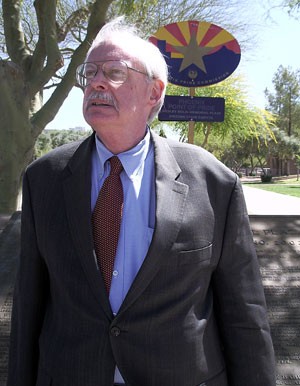PHOENIX – Greg Fahey is a relationship man.
The UA’s main lobbyist and associate vice president for government relations has been in state government for almost as long as some students have been alive.
From higher education to the state’s health care system, to the inner workings of the state Legislature, Fahey knows it, and knows it well.
“”He is an outstanding communicator. He is an extremely good articulator,”” said Charlene Ledet, director of the UA’s legislative advocacy program, who had worked with Fahey for 11 years. “”That, combined with his wit and insight into politics and people and history, have made it a tremendous learning opportunity for me as well as somewhat entertaining.””
Clad in a pressed black suit paired with a crisp, sky blue shirt and a maroon-patterned tie, you’d think Fahey, 61, is just another politician roaming the Capitol.
But as he sits outside the Senate building on a cold cement bench and recites the history of his career, complete with months and years, it’s hard to disagree with Ledet when she says she has never met anyone with a better memory of what has happened in state government.
He knows the background, and can make it interesting and colorful, but also can provide a perspective of what was happening when and why – and he’s funny, she said.
“”There are times when we are sitting somewhere and he’ll make a comment, and it’s really painful to not start laughing,”” she said.
Fahey started out in state government in 1975 as a research analyst for the Senate Health and Welfare Committee. In the summer of 1983, Fahey left the Senate to become the director of Arizona Health Care Cost Containment System, the state’s low-income health care program.
Arizona was the last state to enter into the program, which was experiencing some difficulties because doctors and hospitals alike weren’t used to things like processing paperwork and billing, Fahey said.
Fahey said he was happy to accept a job offer from the UA in the fall of 1984. Since then he has held various responsibilities, including overseeing the Budget and Institutional Research Office.
His breadth of UA experience, combined with that in the state Senate for nine sessions, gives him an inside advantage at the university and the government levels when advocating for the UA’s interests, said former UA President Peter Likins.
“”It’s a relationship business,”” said Likins, who worked with Fahey for nine years. “”In order to push legislators, they need to know you and trust you.””
Fahey’s experience and knowledge have given him the ability to communicate with legislators that some lobbyists may lack, Likins said.
“”When he needs to get in to see somebody, he can make that happen,”” he said. “”These are busy people, and getting their time and attention is not easy.””
Likins worked with Fahey and other university lobbyists for what Fahey considers his greatest accomplishment, getting a research infrastructure bill passed in 2003.
The bill, a brainchild of Arizona State University President Michael Crow, allotted $450 million for research facilities at the state’s three universities.
At the time, the state was coming out of a mild recession, Fahey said.
“”It worked, we got the money and it was a good deal, but in the beginning we were looked at like we had two heads,”” he said.
And how history repeats itself.
This year, the universities are pitching an economic stimulus plan, one that would allow the universities to sell more than $1.4 billion in bonds for construction of buildings and also for maintenance and repairs.
Likins said the state needs to invest in the College of Medicine and correspondingly expand the research funding brought into the state.
Expanding UA’s presence in Phoenix would help the UA be successful in garnering funding in future years, Fahey said.
The UA is still seen as a Tucson entity in Phoenix, he said.
“”There’s a natural tendency now for legislators here to care about ASU and fund that first before UA,”” he said.
The growth of Maricopa County is also pushing down Pima County’s clout in state government, as redistricting – done every 10 years – affects how many legislators are assigned to a district, he said.
Fahey said he disagrees with the saying “”All politics is local,”” attributed to Thomas “”Tip”” O’Neill, who was Speaker of the House from 1977 to 1987.
Likins believes Fahey is well prepared to deal with the challenge of getting legislators to agree to the economic stimulus plan.
“”He’s been part of the fabric of Arizona state government for a very long time, and he has very good friends,”” Likins said.









